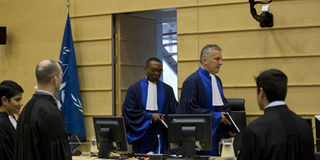ICC judges differ on compensation for PEV victims

ICC's presiding judge in Deputy President Willian Ruto's case Judge Chile Eboe-Osuji (centre) enters the court before a past session. Judges Eboe-Osuji and Robert Fremr differed on whether the court should compensate the 2007/2008 post-election violence. PHOTO | FILE | NATION MEDIA GROUP
What you need to know:
One judge shut the door on any compensation while another said there should be some form of reparation.
Judge Fremr said owing to the absence of a conviction, it was impossible to consider any form of compensation.
Judge Eboe-Osuji, however, said he was satisfied the victims suffered violence and deserved compensation even though the case had collapsed.
ICC Trial Chamber judges differed sharply on what should happen to thousands of victims of the 2007 post-election violence following the termination of Deputy President William Ruto and Joshua Sang’s cases.
In their decisions Tuesday, they failed to agree on the fate of people evicted from their homes and those who lost loved ones.
One judge shut the door on any compensation while another said there should be some form of reparation.
Judge Robert Fremr said owing to the absence of a conviction, it was impossible to consider any form of compensation.
“No reparations order can be made by this court for the benefit of victims of the post-election violence,” he said.
The judge said he empathised with the victims but ruled that any crime against humanity must be proved and suspects found guilty for compensation to be considered.
“While I recognise this must be dissatisfactory to the victims, a criminal court can only address compensation for harm suffered as a result of crimes if such crimes have been found to have taken place and the person standing trial for his or her participation in those crimes is found guilty,” added the judge.
Judge Chile Eboe-Osuji, however, said he was satisfied the victims suffered violence and deserved compensation even though the case had collapsed.
He said there was no doubt violence occurred and that people were affected.
“I am of the firm view that the victims of the post-election violence should not be left in the cold because proceedings before this Chamber were polluted by undue interference and political meddling which obscured an accurate assessment of the criminal responsibility of the accused,” he said.
He suggested various options on how reparations could be done, including forcing the Kenyan Government to compensate the victims.
“It must be said clearly that there is no doubt at all as to the occurrence of the post-election violence. Nor is there any doubt that the violence occasioned serious harm to victims. To repeat, I am satisfied from the available evidence and the admissions of the parties that the violence did occur and that it resulted in serious harm to victims. Notably, the parties never contested those facts and the Chamber has heard nothing that could cast doubt on the overall findings of the Waki Commission in this regard,” added Judge Eboe-Osuji.





